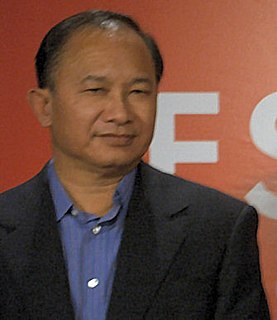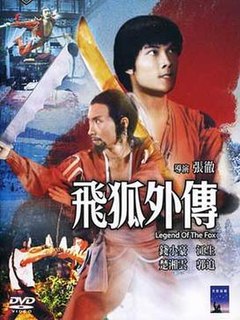This page is based on this
Wikipedia article Text is available under the
CC BY-SA 4.0 license; additional terms may apply.
Images, videos and audio are available under their respective licenses.

John Woo SBS is a Chinese-born Hong Kong filmmaker, writer, and actor. He is considered a major influence on the action genre, known for his highly chaotic action sequences, stylized imagery, Mexican standoffs, frequent use of slow motion and allusions to neo-noir, ‘’wuxia’’ and Western cinema.

Tsui Hark, born Tsui Man-kong, is a Vietnam-born Chinese film director, producer and screenwriter. Tsui has directed several influential Hong Kong films such as Zu Warriors from the Magic Mountain (1983), the Once Upon a Time in China film series (1991-1997) and The Blade (1995). Tsui also has been a prolific writer and producer; his productions include A Better Tomorrow (1986), A Chinese Ghost Story (1987), The Killer (1989), The Legend of the Swordsman (1992), The Wicked City (1992), Iron Monkey (1993) and Black Mask (1996). He is viewed as a major figure in the Golden Age of Hong Kong cinema and is regarded by critics as "one of the masters of Asian cinematography."
Flying fox is a common name for bats of the genus Pteropus.
Tony Leung Ka-fai is a Hong Kong actor who is a four-time winner of the Hong Kong Film Award for Best Actor.
Hong Kong action cinema is the principal source of the Hong Kong film industry's global fame. It combines elements from the action film, as codified by Hollywood, with Chinese storytelling, aesthetic traditions and filmmaking techniques, to create a culturally distinctive form that nevertheless has a wide transcultural appeal. In recent years, the flow has reversed somewhat, with American and European action films being heavily influenced by Hong Kong genre conventions.

Soldier of Fortune is a 1955 DeLuxe Color adventure film in CinemaScope about the rescue of an American prisoner in the People's Republic of China in the 1950s. It was directed by Edward Dmytryk, starred Clark Gable and Susan Hayward, and was written by Ernest K. Gann based on his 1954 novel.
Shek Wing-cheung, better known by his stage name Shih Kien, was a Hong Kong–based Chinese actor. Shih is best known for playing antagonists and villains in several early Hong Kong wuxia and martial arts films that dated back to the black-and-white period, and is most familiar to Western audiences for his portrayal of the primary villain, Han, in the 1973 martial arts film Enter the Dragon, which starred Bruce Lee.

The Flying Fox of the Snowy Mountain 1999 is a Hong Kong television series adapted from Louis Cha's novels Fox Volant of the Snowy Mountain and The Young Flying Fox. The series was first broadcast on TVB in Hong Kong in 1999.
Cherie Chung Chor-hung is a retired Hong Kong film actress. Of Hakka ancestry, she was one of the top actresses in Hong Kong film during the 1980s.

Flying Dagger is a 1993 wuxia comedy film directed by Kevin Chu and written and produced by Wong Jing. The film features a large cast of stars and parodies numerous Hong Kong films.

The Flying Fox of Snowy Mountain is a Hong Kong television series adapted from Louis Cha's novels Fox Volant of the Snowy Mountain and The Young Flying Fox. It was first broadcast on TVB in 1985.
Fox Volant of the Snowy Mountain, known as Xue Shan Fei Hu in Chinese and alternatively Flying Fox of Snowy Mountain, is a novel by Jin Yong. It may also refer to:

The Tale of Loyal Heroes and Righteous Gallants (忠烈俠義傳), also known by its 1883 reprint title The Three Heroes and Five Gallants (三俠五義), is an 1879 Chinese novel based on storyteller Shi Yukun's oral performances. The novel was later revised by philologist Yu Yue and republished in 1889 under the title The Seven Heroes and Five Gallants (七俠五義), with the story essentially unaltered.

Saviour of the Soul is a 1991 Hong Kong martial arts action film, directed by Corey Yuen, and starring Andy Lau, Anita Mui and Aaron Kwok. Although the film shares the same Chinese title as Louis Cha's The Return of the Condor Heroes, it is unrelated to the novel.
The Flying Fox of Snowy Mountain is a 1978 Hong Kong tele-film adapted from Louis Cha's novels Fox Volant of the Snowy Mountain and The Young Flying Fox. The series was produced by CTV.
The Flying Fox in the Snowy Mountains is a two-part 1964 Hong Kong film based on Louis Cha's novel Fox Volant of the Snowy Mountain. The film was produced by Emei Film Company and directed by Lee Fa.
The Flying Fox, also known as The Purple Lightning Sword, is a 1964 Hong Kong wuxia film produced by Gam Wing and directed by Siu Sang.
The Five Younger Gallants (小五義) is an 1890 Chinese novel and the best known sequel to the hugely popular 1879 novel The Tale of Loyal Heroes and Righteous Gallants. It is followed a year later by Sequel to the Five Younger Gallants (續小五義). Both sequels were published by Shi Duo (石鐸) who owned the Beijing publisher Wenguang lou (文光樓). The editor was a "Captivated-Wind Daoist" (風迷道人). It's unknown whether he was the same person as "Captivated Daoist" (入迷道人), an editor of the 1879 novel.










